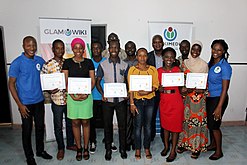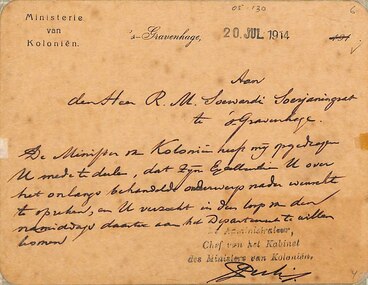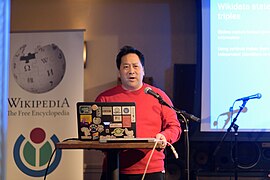GLAM/Newsletter/January 2018/Single
We came, we saw, we conquered!

1Lib1Ref in Queensland: Still no serious competition in sight!
See our statistics!
Eat our dust! Kerry Raymond (talk) 05:21, 7 February 2018 (UTC)
Books, librarians, encounters and borrowed data
2017 has been a hectic year for the Basque Wikipedia and its main agent, the Basque Wikimedians User Group. It has afforded us a springboard to tie new partnerships, and get a financial plan for the Education Program. Wikilibraries centred in Donostia (San Sebastián) has not lagged behind.
Synergies with publisher Elhuyar are also bearing fruit. An agreement with them has enabled a first systematic inroad into the Wikidata by adding a full load of terms stored in their specialized dictionary into the platform.
End of Wikilibraries' year
During the fourth term, librarians from Donostia have gathered on Friday for a couple of hours in the program Idazlezainak, the "Writerguards", aimed at recording the writers' voices, providing sources and releasing Basque literature licenses, such as book covers and illustrations. The program takes a special focus on children literature.
Their pursuit was duly rewarded in a modest event celebrated in the basement premises of the Victoria Eugenia theatre. The open event was attended by librarians, culture personalities and other attendees. It also paved the grounds for a meeting held with librarians from the French Basque Country in Bayonne, taking place on 18 January, that is expected to pave the grounds for further cross-border collaboration around literature in the near future.
Wikilibraries at the Durango Fair


The yearly Durango Fair is an excellent platform to showcase the initiatives taken in the Basque Wikipedia by the Basque Wikimedians User Group. On 8 December, the space Kabia, besides harbouring a presentation of the ongoing Basque Education Program, played host to another presentation outlining the progress and fruits of Wikilibraries 2017. We also seized the opportunity provided by this central cultural encounter to stage a photo-call and take pictures of Basque literature and culture personalities attending the event. Hundreds of pictures were taken that will supply Wikimedia Commons and Wikipedia articles with fresh photo files.
Wikidata breakthrough
Wikidata has opened new avenues for minority languages to develop their WP projects. For over an year, we have been in touch with Elhuyar, a Basque publisher specializing in dictionaries and terminology. This collaboration framework has paved the grounds to release several scientific materials to Commons license, accessible now for the Wikipedia. The turn of the year 2018 has brought up further, fabulous news in the form of an agreement with Elhuyar to transfer 6,500 definitions from their prolific, free license Zientzia eta Teknologia Hiztegia ("Science and Technology Dictionary") into the Wikidata, completed by mid-January. This is but the first lot of terms from Elhuyar due to be transferred to Wikidata in the upcoming months.
The terms added include items like Zetonemia, or Txoriandre pispoleta, specialty words we would hardly use in everyday life, clearly, but very necessary in their respective scientific domains. Two Wikidata properties have been targeted, i.e. the fields "Label" and "Definition". After identifying the relevant scientific concepts in English, French and Spanish, they were paired to the definitions available in the Elhuyar database by double-checking them in close-up scrutiny. This will open the opportunity to add more Basque language definitions equivalent to concepts available in Russian, Arabic and other projects.
Book presented

The Basque Wikipedia - Community Association of Ulia partnership has extended for over two years, including the collaboration of botanists, as well as ornithologists, and the use of QR technology. The polished, 2nd edition of the park's fauna and flora catalogue is now available throughout different Wikipedia articles in Basque and main languages. In addition, an introduction and compilation of the work done so far has been made into a book holding now 362 pages and 89 articles.
This version has been enlarged with 10 new articles and corrections to previous articles. On 29 January, the book's hard-copy version was presented on press release held in Donostia. Samples of this limited edition will be distributed for diffusion as a gift among libraries from Donostia, and have also been presented to representatives of the 5 political parties operating in the city council; see further info (Basque) and media in the link provided above. The publication of these copies relies on funding provided by the Wikimedia Foundation, and they are now available for purchase here, also in pdf through Wikimedia Commons.
#1Lib1Ref, Côte d'Ivoire participates for the 2nd time
Preparing #1Lib1ref with APSID-CI, a GLAM partner

After taking part in the 2017 edition of #1Lib1ref, the community from Côte d'Ivoire organized a set of activities as part of the #1Lib1ref campaign 2018. Among these activities was a preparation meeting with APSID-CI, an organization gathering librarians and with which we signed an agreement recently. The goal of this meeting was to prepare a #1Lib1ref edit-athon scheduled for 26 January.
11 articles improved by 11 librarians,
On Friday January 26, a workshop was held at the headquarters of Wikimedia Community User Group Côte d'Ivoire (WCUG-CI). The session started with a discussion between participants and volunteer wikimedians around Wikipedia pillars and the content gap regarding African contents. Shortly after the discussion, a more practical phase took place and librarians were given the chance to improve contents related to their country. Each participant improved one article by inserting references, fixing typos, or adding additional information backed up by a reference. Statistics are available on outreach dashboard.
This year in Côte d'Ivoire, #1Lib1ref sessions will be extended beyond February 03. Two upcoming edit-athons are scheduled with librarians: 23 February and 23 March.-
Discussion between participants and wikimedians
-
It's time to edit
-
Colette, with a participant.
-
Family picture
Fonds André Cros; #1lib1ref; Library of Dinan; LATMOS
Fonds André Cros

The city of Toulouse decided to release under a free licence all the images it has the copyright of. This included 7000+ pictures from André Cros of 50s, 60s, 70s and 80s, including lot of Civil Aviation history alongside operettas, sportspeople, and artists of these years.
#1lib1ref
Several libraries, librarians and other people are currently taking part in the third edition of the #1Lib1Ref campaign. This year, Wikimedia France got the support of the ABES (Bibliographic Agency of Higher Education) which has supported the project diffusing and communicating on it among its network. Final results next month but, right now, the French is at the second place in numbers of references added (thanks to others french speaking country, in particular in Québec!).
Library of Dinan
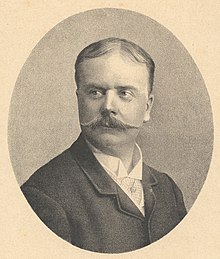
The municipal library of Dinan (Brittany) is setting up a series of workshops around Wikipedia. As a first step, the librarians have received a training formation, many workshops and improved articles should follow soon.
LATMOS

The LATMOS is a research laboratory specialized in terrestrial and planetory atmospheric analysis. It was involved for example in the Rosetta project. The laboratory is planning to gather archives and images of the robots and instruments which were used in the past projects. In this context, a presentation of Wikipedia was made during december to the ex-staff members of LATMOS. The gathering could take a while but this collaboration could lead to partnership focused on Wikimedia commons and Wikipedia editing.
sustainability beyond metrics
a video to document your project
Many of our projects in the GLAM field are events. Editathons, photo-safari, backstage tours or hackathons. Volunteers are participating, GLAM institutions are partnering and the Wikimedia staff supports the project management. Last month we celebrated the award ceremony our large GLAM hackathon Coding da Vinci here in this news letter. We also produced a little film. It was released last week. A basic learning producing a documenting video I would like to share with you. It normally takes money to engage a professional film team, but even more important is that you ought to define, what do you want to show. What shall be the main message of the video? Briefing the film team we told them, the main goal was obtaining a short promoting video to inform on Coding da Vinci as a GLAM hackathon and to spur partnerships and participation. I wonder now, if we succeeded. I would like Your feed back. Please watch the video and tell us: Does the video show
- how much fun it was taking part?
- who were the important stakeholder groups?
- what were the outputs of Coding da Vinci?
- what makes Coding da Vinci a special hackathon?
P.S. We have no subtitles yet. Give us a hand, please.
partnering for sustainability
This paragraph is looking at Coding da Vinci from an other angle. We all strive for sustainability. Organizing a hackathon this could mean the applications created through the hackathon. What do the teams need to keep working on their projects? How to spur the GLAM partners to collaborate further with the coders on the apps, websites or augmented reality, VR- applications? Is there a wider potential or even a business case? Wikimedia Deutschland cannot spend to much effort here, as it would be beyond our scope defined in our annual plan. But it is vital for the outcomes of Coding da Vinci all together to show off fancy results of re use of open GLAM data. AND gaining open GLAM content is what we want. Thus we were happy to find a partner in the Coding da Vinci network taking on this perspective. Coding da Vinci in its forth year has gained so much reputation that partners are ready to increase their engagement. After some years participating as simple content provider at Coding da Vinci the Natural History Museum Berlin was now eager to spur re use of open data among creative industries. They looked for ideas and whom to put into joint ventures. Their interests matched the ones of Coding da Vinci. So they arranged a meet-up after the hackathon with entrepreneurs, scientists and the hackers from Coding da Vinci. Together they evaluated in small groups how to continue to work on the applications and defined next steps they shall take together. We helped to invite the participants and happily watched the becoming of new alliances. The workshop was arranged and financed by the museum. I think everybody benefited. Please follow the outcomes.
Digitizing the letters from Dewantara Kirti Griya Museum Yogyakarta continues
Transcribing the letters in Dutch Wikisource
Wikimedia Indonesia via Wikimedia Netherlands asks for help to volunteers to transcribe the letters in Dutch Wikisource as most of the letters are in Dutch languages. The transcribing process is required before translating those documents into Bahasa Indonesia. One of the transcribing volunteers is WeeJeeVee, who is fascinated in doing transcribing text to Dutch Wikisource and has set up a page about this activity in Dutch Wikisource.
Another volunteer involved in this activity is Sersan Mayor Kururu, an Indonesian Wikipedian. She is a university student in Yogyakarta and has knowledge in the Dutch language. Sersan Mayor Kururu has helped Wikimedia Indonesia for the past five months in doing letter conservation and digitization.
-
A handwritten letter has now been transcribed on Dutch Wikisource.
-
A handwritten letter from Ministerie van Koloniën has now been transcribed on Dutch Wikisource.
-
Letter from Ministerie van Koloniën has now been transcribed on Dutch Wikisource.
Translating the letters
Started from January 2018, the letters were translated into Bahasa Indonesia from Dutch, English, and Javanese languages to provide what the letters say to people widely, especially for the people in Indonesia. This effort will continue until the end of February and done by Meursault2004, a senior Wikipedian from Indonesia.
Some of his translations can be seen at File talk:TDKGM 01.007 Koleksi dari Perpustakaan Museum Tamansiswa Dewantara Kirti Griya.pdf. Full contributions of Meursault2004's translations can be seen here.
-
A copy of letter from Ministerie van Koloniën. See the translation here.
-
Letter from het Indonesisch Persbureau. See the translation here.
-
Letter from H. Colijn to Ki Hadjar Dewantara. See the translation here.
Seventeen: let's talk and celebrate!
Wikipedia goes seventeen
Two events, in Pisa and Milan, were organized on 15th. Two opportunities to talk with humor and cordiality of the project and the community... and, of course, to eat a birthday cake.
-
Wikipedia 17th birthday celebrations in Milan
Do librarians dream of Wikipedia?
On January 25th, the BRAU Library of the University of Naples Federico II hosted the seminar Do librarians dream of Wikipedia?, dedicated to Wikimedia collaborations with libraries and educational programs. The six talks illustrated possible forms of interaction: from the wiki projects for schools and universities in Italy to #1Lib1Ref activities; from writing articles about special collections to the authority data loading in Wikidata and how all these activities can be integrated into the offer of services and information of libraries and universities. At the end of the event, Wikimedia Italia hosted speakers and participants at Spazio Nea in Naples to celebrate Wikipedia's 17th birthday.
Reach out project

Reach Out! Skills, strategies, impacts for the museums of Campania is a project that comes from the collaboration between the Campania Museum Complex and several partners including Wikimedia Italia. A segment of the project concerned the internship of a class of students at the Royal Palace of Naples, hosted by the National Library of Naples: during GLAM/Polo museale della Campania twenty students were trained on the Wikimedia projects, in particular Wikipedia and Commons. Four italian articles have been written about important artists with works in the Royal Palace of Naples, such as Gennaro Maldarelli and Adam Weisweiler.
Women in STEM @ University of Padua

On January 27th, 2018 took place at Digital Learning and Multimedia Office of University of Padua the first of 4 editathons named WikiDonne on the road (part of WikiDonne roadmap grant).
From the list of over 60 articles that WikiDonne User Group selected to be write or improved, were written 7 new biographies (typical examples of Matilda effect) about Women in STEM fields, a very uncovered topic about women in Italian Wikipedia. Specifically were translated from English 6 new articles about ENIAC girls, among the first programmers in the world:Frances Spence (Fran Bilas), Betty Holberton (Betty Snyder), Jean Bartik (Betty Jean Jennings), Marlyn Meltzer (Marlyn Wescoff), Ruth Teitelbaum (Ruth Lichterman), Kathleen Antonelli (Kay McNulty) and Cynthia Solomon (missing, along with Wally Feurzeig, among the inventors of the programming language for children Logo).
Importance of digitization in 21 century & Velo-city edit-a-thon
Importance of digitization in 21 century

On 18 January 2018 GLAM Macedonia organized open discussion "Importance of digitization in 21 century" in collaboration with the City Library "Braka Miladinovci" in Skopje. This event was organized to celebrate Wikipedia 17 in Macedonia, and also to support #1Lib1Ref campaign.
Four speakers had their presentation on importance of digitization in the GLAM institution they work for:
- Jasmina Najdovska, advisor for archiving material, a new period, from The State Archives of Republic of Macedonia,
- Daniela Mitevska, historian educator from the Museum of Macedonian struggle in Skopje,
- Gordana Andreeva, program manager from the City Library and
- Gordana Jovik Stojkovska, who is Wikipedian in Residence in the City Library.
The event itself was announced on national TV channel.
All photos from the event are in this category.
Velo-city edit-a-thon
On 18 January Shared Knowledge had the first edit-a-thon in this year. This edit-a-thon was organized jointly with the cyclists-members of the Critical Mass / NaTo4ak initiative on the topic: "Velograd" (meaning: velo-city) with the main aim to improved and broaden the content of information about cycling infrastructure and issues on the articles on Wikipedia on Macedonian language. The event took place at the self-sustainable social center "Dunja" in Skopje where over 20 people first had a lecture on Wikipedia and then 11 participants created 11 new articles.
Local heritage made available through Wikimedia & 3rd Wikicafé Tilburg
Local heritage made available through Wikimediaː Erfgoed Gelderlan Wikimedian project
In 2017 the Wikipedian in Residence in Gelderland has worked together with seven small regional GLAMs to make their collections available on the Wikimedia projects. At the close of the project, 3993 images on various topics (archaeology, Second World War, silverware and press pictures). Take a look at them hereː https://commons.wikimedia.org/wiki/Category:Wikipedian_in_Residence_in_Gelderland
On the 19th of january we held an inspiring symposium on the use of sharing your collections on Wikimedia with lectures and workshops on sharing audiovisual content, Wikimedia apps, Wikidata & heritage and monitoring your content. Most slides of the workshops and lectures can be found on Commons (the presentations by Hay Kranen and Sandra Fauconnier have only been shared on the Erfgoed Gelderland website due to copyrighted content.)
In light of the project, a manual for GLAM employees for working with Wikimedia has been published (in Dutch)ː https://commons.wikimedia.org/wiki/File:GLAM_manual_Erfgoed_Gelderland_1.0.pdf If you master Dutch I would love to hear your feedbackǃ
Continuing on a happy noteː the project has been prolonged for another year. We will be working with some of the same GLAMs we worked with last year and also a new group to help them make their collections available. We are also looking into making instruction video's and online courses for GLAM employees w.r.t. Wikimedia. If you have suggestions in this field, I would love to hear from you too. You can contact me on my talk page or by e-mail.
3rd Wikicafé Tilburg
On 4th January 2018 the 3rd Wikicafé took place in the public library in Tilburg. The theme of the evening was how to upload self-made photos of municipal monuments to Wikimedia Commons and how to use them in Wikipedia articles. Special attention was paid to Creative Commons licensing and putting images into proper Commons categories. The Wikicafé is an initiative of the public library Bibliotheek Midden-Brabant.
Public Domain Day
On January 1st, many Wikimedians celebrate Public Domain Day. On this day, creative works whose authors died 70 years ago, enter the public domain and can be used on Wikimedia platforms and elsewhere, free of charge. On January 5, WMNL co-sponsored a small workshop on public domain in the Netherlands. This workshop included several lectures on different aspects of public domain - from a legal perspective, to re-use, to the problems and opportunities of maintaining a collection that is now PD. Some 60 people attended. More info here.
A call for Wikipedians to edit articles related to the collections that entered the public domain did not deliver expected results. Reasons may include timing (right after the annual writing week on countries on WPNL), topic (many of the relevant authors already had an article on WPNL), and/or organisation ( short-term, lack of communication).
#1Lib1Ref
Like previous years, WMNL set up the 1lib1ref campaign to motivatie librarians and scientists to contribute to Wikipedia by fact-checking an article and adding a relevant source to it. The campaign runs into February, so results will be available by then. Landing page here.
3000 images from Regionaal Archief Nijmegen
The Regionaal Archief Nijmegen, one of the participating institutions in the 2017 project A Wikimedian in Residence in Gelderland, donated some 3500 images to Wikimedia Commons. The upload was done with Pattypan, using the latest release that makes it possible to upload images from a web URL. The images document the history of the city of Nijmegen and span the last ~100 years. The collection can be accessed here.
Image collection from Armenia and Sami bibliography
Bodil Biørn image collection

The collaboration Wikimedia Norge has with Wikimedia Armenia started with an online editing contest about Armenia and Norway in 2016. During this collaboration, we could discuss the idea of doing a digitalization and transcribe project on images taken in Armenia from about 1905-1930 by the Norwegian Bodil Biørn. The images are at The National Archive in Oslo. Wikimedia Norge received 100 000 NOK in funding from The Arts Council in Norway for this project. The project and the funding application to The Arts Council in Norway were endorsed by The National Archive in Oslo, Wikimedia Armenia and the Genocide Museum in Armenia. Wikimedia Norge were 1 of 24 applying for funding, and 14 projects were granted funding from The Arts Council, who writes in the grants announcement:
"The Arts Council do note that two of the projects are particularly important in light of the perspective women in history. (...) One of these is Wikimedia Norge’s project “The photo albums from Bodil Biørn”, where 200 photos will be digitalized and the image descriptions written by missionary, nurse and midwife Bodil Biørn (1871–1960) will be digitalized and transcribed. Biørn proselytized in Armenia from 1907 till 1935 and witnessed the mass killings of Armenians in The Ottoman Empire during World War I. This material is assessed as having significant national and international interest and it’s encouraging that a process is started to bring it into the open." The Arts Council's announcement on granted funding
Sami bibliography from The National Library
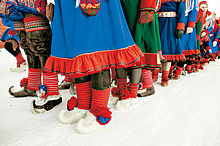
Wikimedia Norge is working on a project to support the Northern Sami Wikipedia. One of the things we are working on is to import the Sami bibliography from The National Library to Wikidata. The Sami bibliography is a joint project between the National library of Norway, the Sami special library at the Rovaniemi Provincial Library in Finland, the Murmansk State Regional Universal Scientific Library, and Ájtte, Swedish Mountain- and Sami museum. All documents use the Løøv classification.
#1lib1ref first time in Serbia: 786 references added!
Global campaign #1Lib1Ref in its first year in Serbia showed a great interest of librarians of two signtific Serbian libraries, but the other editors too, to participate and add missing references to Wikipedia.
Wikimedia Serbia sent the invitations to more than 50 libraries in Serbia, but the main partners in this campaign were University Library “Svetozar Markovic” and Belgrade City Library. On January 23rd University Library hosted a workshop for newbies, but experienced Wiki-librarians as well. Ivana Guslarevic, GLAM coordinator of Wikimedia Serbia introduced participants with the Wikimedia movement, but also the importance of libraries for Wikipedia, showing the examples of partnerships and contributions around the world. Aleksandra Popovic from the University Library held a practical workshop of editing Wikipedia, showing librarians how to add references. Just in that day, librarians added more than 100 references! But, the other goals were reached too, like expanding an interest for more contribution to Wikipedia. Some of the newbies reached Wikimedia Serbia in next days wanting to contribute even more, especially in writing new articles.
Later in February it will be organized a new event for all contributors in this campaign. Wikimedia Serbia will symbolically award three librarians with the biggest number of edits with a vouchers for books and other wiki-promo material.
#1Lib1Ref
#1Lib1Ref
Between January 15 and February 3, Wikimedia Spain promoted the participation in the #1Lib1Ref campaign through social media and several mailing lists for librarians and archivists, around 6,000 receivers. At the end of the campaign, on the Spanish Wikipedia 82 edits were made on 60 pages by 28 users, with a total of 56,023 bytes modified.
Photos, 3D and training with the National Heritage Board
Photos, 3D and training with the National Heritage Board

The photo exhibition from Connected Open Heritage arrived to the National Heritage Board (Riksantikvarieämbetet) in January and is on display in the entrance (where also the staff from the police pass through).
The National Heritage Board is, together with Wikimedia Sverige, developing a tool to make it easier for GLAMs to publish 3D-files. In January there was a kick off hackathon.
During January a three sessions internal refresher course was held with a session for each Wikipedia, Wikimedia Commons and Wikidata.
Upload Book
Upload of the book Ce que fut le Congrès
On 26 January we uploaded the book Ce que fut le Congrès
- Category: https://commons.wikimedia.org/wiki/Category:Ce_que_fut_le_Congr%C3%A8s
- Category: https://commons.wikimedia.org/wiki/Category:Wikipedian_in_Residence_at_Diocesan_Library_of_Tunis
Upload of the book Rome et Carthage.pdf
On 31 January we uploaded the PDF form of the book Rome et Carthage
- Category: https://commons.wikimedia.org/wiki/Category:Rome_et_Carthage
- Category: https://commons.wikimedia.org/wiki/Category:Wikipedian_in_Residence_at_Diocesan_Library_of_Tunis
Upload of the book L'amphitéâtre de Thibari.pdf
On 31 January we uploaded the PDF form of the book L'amphitéâtre de Thibari
- Category: https://commons.wikimedia.org/wiki/Category:L%27Amphith%C3%A9%C3%A2tre_de_Thibari
- Category: https://commons.wikimedia.org/wiki/Category:Wikipedian_in_Residence_at_Diocesan_Library_of_Tunis
-
Ce que fut le Congrès 42
-
L'amphitéâtre de Thibari
-
Rome et Carthage
Oxford Wikidata project
Oxford Wikidata project
From November 2017 to March 2018, I, Martin Poulter, am working for the Oxford University’s IT Services on a project related to Oxford’s GLAM collections. This is one of a suite of pilot projects exploring how the treasures of Oxford’s libraries, museums and gardens can be made more discoverable.
The project involves sharing some collection data on Wikidata, building a proof-of-concept resource discovery tool, then using analytics to evaluate the additional interest in the GLAM catalogues both from our tool and from other Wikidata-driven sites.
I have built a prototype interactive interface in PHP, making calls to Wikidata Query Service, Wikipedia API and Wikimedia Commons to get item properties, descriptive text and images. The idea is to encourage exploration of a web of knowledge, in the spirit of Crotos or Textes d’Affiches. We are guided by concepts of entity-based searching[1], generous interfaces[2] and by extensive research that the university has already been carried out on the discoverability of its GLAM collections. We are now working on data imports, and on getting a server on which to host the eventual proof-of-concept.
Another ongoing project is OXLOD (Oxford Linked Open Data), exploring how collection and research data can join in a common data model, using similar principles to Wikidata. There has already been some overlap between the Wikidata project and OXLOD: I have used Wikidata to provide some external identifiers that are useful to OXLOD and have developed a process to get identifiers from Wikidata for entities that are just known by Chinese names. In return, OXLOD are giving access to data sets, some of which can be shared on Wikidata.
I am taking the opportunity to use meetings and presentations to raise awareness of Wikidata as a master authority hub and as a data backend on which to build interesting software.
Libraries at the Forefront of Running All-Out Action for Ukrainian Wikipedia
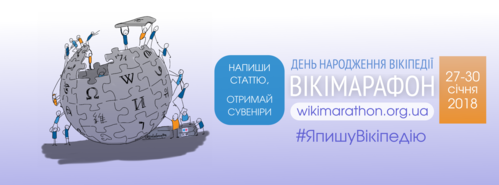
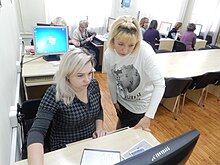
Ukrainian Wikipedia turned 14 on January 30. Wikimedia Ukraine has organised Wikimarathon to celebrate the date. The main idea is to invite people to create at least one article to thank Wikipedia for knowledge it provides. This year Wikimarathon's edition lasted for four days: January 27-30
To make it easier for all interested and existing editors to take part in the motion and collaborate face to face, Wikimedia Ukraine inspirited and supported meetups for these days. More than 40 settlements were on the Wikimarathon`s meetups map and nearly 30 of them were hosted by public or university libraries. Volunteers have collaborated with the libraries to host wikimeetups, where everyone could come and take part in Wikimarathon and check books for information. The events brought together a diverse group of Wikipedians, students, schoolchildren, libraries patrons, and librarians to add and improve Wikipedia content. Moreover, in some locations librarians were not just guests, participants or hosters but also volunteered to coordinate meetup and introduce participants to Wikipedia rules.
Wikimarathon resulted in 2500 articles (750 were created by bots). So the average daily number was 3 times bigger than the average number of articles created in Ukrainian Wikipedia along the year. 600 users reacted to Wikimedia Ukraine`s appeal by contributing a new article, among them 171 registered during Wikimarathon days.
-
2509 new articles have been created during the 4 days of Wikimarathon (link)
-
750 articles created by bots
-
600 editors created at least one article
-
171 newly registered editors
-
The offline events happened in 42 populated places
Selected articles created by librarians:
- Регіна Йонас
- Якубовський Ігор Петрович
- Грета Стівенсон
- Рената Скотто
- Ольга Самар
- Лемпворк
- Шерстюк Тетяна Григорівна
- Єрік
- Анчишкін Владлен Миколайович
- Парк імені Володимира Правика (Ірпінь)
Wikipedia Day
Wikipedia Day 2017 New York City
Wikimedia NYC and Free Culture Alliance NYC, held a meetup at the Ace Hotel in Manhattan, Wikipedia Day 2018. About 150 people attended! - video by Internet Society is available Wikipedia Day 2018 NYC
Ser Amantio di Nicolao interviewed by Signpost
Prolific editor, Ser Amantio di Nicolao, was interviewed by Signpost, 2018-01-16 Interview
Georgetown Slavery Archive Editing Workshop
Wikimedia DC and Georgetown University held a meetup, Georgetown Slavery Archive Editing Workshop
Wikipedia:Meetup/San Diego/January 2018
Wikimedia San Diego held a meetup at Mission Valley Branch library, San Diego/January 2018
University of Minnesota Libraries #1lib1ref
University of Minnesota Libraries held a meetup as a part of the 1lib1ref initiative, University of Minnesota Libraries/
Our constraint reports won't constrain you!
We mourn the loss of our friend and fellow Wikimedian Krzysztof Machocki, aka Halibutt, who died on 31 January, aged just 36, after a couple of weeks of illness. Messages of condolence may be left on the Polish Wikipedia (in Polish or English) at pl:Wikipedysta:Halibutt/Księga. Our projects will be poorer for his absence.
GLAM news
- Wikidata was represented at PIDapalooza 2018 with a session on 'PIDs in Wikidata' by Andy Mabbett and the presence of several other contrutors. (Slides on FigShare)
- Call for papers for Celtic Knot conference is open
- Request for comments: Privacy and Living People
- Its time to start organizing an event for Wikidata's 6th birthday in October 2018!
- Painters gives you a list of paintings that don't have a creator statement but "painting by" in the description. You can help to fix them!
- More than 600 properties now have a corresponding catalog in Mix'n'match.
- repology is a new project about software packages, using Wikidata. They have a list of potentially outdated packages on Wikidata that might need updating or fixing.
- Wikidata-driven infoboxes, with multilingual labels, are now available on Wikimedia Commons category pages
Further reading, listening and viewing
- An IRC office hour on the channel #wikimedia-office, was held on January 30th, including a special topic: how to address the growth of Wikidata. You can read the logs.
- WikiJabber podcast with Andy Mabbett
- The WikidataCon 2017 report
- Results of two research projects for Structured Data on Wikimedia Commons
- Supporting Commons contributions by GLAM institutions: an overview of how cultural institutions contribute to Wikimedia Commons, and which issues they encounter there
- Baseline Metrics for Structured Data on Wikimedia Commons: an overview of measurable behaviors on Wikimedia Commons, against which the effectiveness of structured data can be measured in the future
- A short summary of the workshop with historians using Wikibase to collect data about the Illuminati, at Wikidata:FactGrid
- How would the World look like if countries were as large as their Wikidata items are used across the Wikimedia projects?
- The Tom Longboat Awards as Wikidata - Mita Williams
- Using the Semantic Web to Improve Knowledge of Translations - Karen Smith-Yoshimura (OCLC)
- There is no deadline so every second is one: on anxiety, perfectionism, and Wikimedia projects by Léna
- Up2date software versions for Wikidata by Michi
- Big City Lights: where are the cities whose items are most used across the Wikimedia projects?
- Getting data from Wikidata into WordPress custom taxonomy
- Mapping Wikidata to Bibframe (representation of books)
- Some of the developers attended the Wikimedia Developer Summit 2018. You can find some notes on the Phabricator board
Tech developments
- Breaking change: wbcheckconstraints status parameter
- Wikidata moved to a dedicated, and better server
- New Wikidata vandalism dashboard for Wikipedia
- Big improvements to the ranking of results in the entity suggester
- Improvements to how we use constraints
- Prevented checking of constraints on "Wikidata property example" statements (phabricator:T183267)
- Added link to the property's talk page to the constraint violation dialog to guide people there to discuss the constraint if necessary (phabricator:T164351)
- Added support for a constraint scope in the constraint check gadget (phabricator:T183542)
- Now ignoring deprecated constraints in the constraint check gadget (phabricator:T180874)
- Added new Lua function getAllStatements (phabricator:T166056)
- Added support for relation instance or subclass of in the constraint checks (phab:T169858)
- Now also checking single value and multi value constraints on qualifiers and references (phab:T175566)
- Now also checking difference within range constraints on qualifiers and references (phab:T175565)ians]
- Constraint violations can now be checked on qualifiers and references (phab:T168532)
- Google Code-In 2017 work on the Wikidata Query Service UI:
- add highlight and selection for query result table (phabricator:T183807)
- keyboard accessibility (phabricator:T173213 and subtasks)
- make more areas translatable (phabricator:T171636)
- mobile / responsive menus (phabricator:T154890)
- lazy loading in ImageGrid(phabricator:T166216)
- Redirects on client wikis that are connected to a Wikidata item can have a tracking category, if set up (phab:T185743)
- Improved documentation of the
pagetermsquery module (gerrit:406240). - Improved empty "content was:" in deletion logs for entities (phab:T184025)
- Fixed links to external user pages in recent changes (phab:T183019)
You can see all open tickets related to Wikidata here.
New GLAM-related properties
We have a new format this month, dividing the new properties in two groups, and would be grateful for your feedback.
General datatypes
- title page number
- produced sound
- animal breed
- is proceedings from
- Commons compatible image available at URL
- is a hydrated form of
- biological phase
- lot number
- has boundary
External identifiers
- Smithsonian American Art Museum ID
- World of Spectrum ID
- Ent'revues ID
- VOGRIPA ID
- Barnes Foundation ID
- Guardiana ID
- CHGIS ID
- Minneapolis Institute of Art artwork ID
- Walters Art Museum ID
- Guide to North American Birds ID
- Académie des Inscriptions et Belles-Lettres member ID
- Académie française member ID
- MuBE Virtual ID
- GSMArena phone ID
- Le Maitron person ID
- C-SPAN organization ID
- Sign@l journal ID
- Deutsche Synchronkartei dubbing voice actor ID
- uBio ID
- INRAN Italian Food ID
- Mir@bel journal ID
- IUPAC GoldBook ID
- IBM code page ID
- IBM coded character set ID
- IBM graphic character global ID
- Solomon R. Guggenheim Museum artwork ID
- Yale Center for British Art artwork ID
- Musée des Augustins artwork ID
- Brooklyn Museum artwork ID
- OpenEdition journal ID
- Uniform Resource Identifier Scheme
- Elhuyar ZTH ID
- Line Music artist ID
- Line Music album ID
- Dictionnaire des auteurs luxembourgeois ID
- National Historic Ships certificate no.
- Manus Online ID
- Ecocrop ID
- Harvard botanical journal ID
- UK railway station code
- V Live channel ID
- Songwriters Hall of Fame ID
- MONA ID
- Luminous-Lint ID
- LTI Korea Library ID
- Images d'Art artwork ID
- Common Database on Designated Areas ID
- crates.io ID
- Arcade artwork ID
- Australian honours ID
- cinematografo company ID
- cinematografo name ID
- GameRankings game ID
- compArt institution ID
- compArt person ID
- MobyGames company ID
- MAC Address Block Large ID
- MYmovies actor ID
- MYmovies movie ID
- MYmovies director ID
- Movieplayer characters ID
- Movieplayer film ID
- Movieplayer TV-series ID
- MYmovies name ID
- cinematografo film ID
- CiNii author ID (articles)
You are invited to comment on all open property proposals.
Call for case studies, #1lib1ref, Structured Commons and more
Call for Case Studies!
The Community programs team is still looking for case studies, to highlight the great work that is going on around the world in GLAM, Education, and other programs. For that reason, we have decided to extend the case studies collection period, and will be providing additional opportunities to work on case studies together with you!
Additionally, at Wikimedia Conference, Wikimania and other regional conferences, we will be holding clinics to help you draft your case study. We will also hold several virtual clinics where Wikimedia Foundation Programs staff can give you feedback and support on developing your own case studies (keep your eye out for invitations for these workshops!).
- If you thought you might want to submit a case study, but haven’t done so yet: please let us know that you are interested by emailing astinson
 wikimedia.org or nsaad
wikimedia.org or nsaad wikimedia.org.
wikimedia.org. - We can support you in drafting or developing the case study using the case study templates on outreach. If you would like to share a case study you have already drafted, you can still do so through the input boxes on the same page.
- Learn how to add a case study.
#1lib1ref 2018 and library-related blog posts

To highlight this year's #1lib1ref campaign, the Wikimedia Foundation team published several blog posts, with a focus on the importance of Wikipedia and Libraries Collaboration:
- On #1lib1ref: https://blog.wikimedia.org/2018/01/16/1lib1ref-2018/
- On Cote d’Ivoire: https://blog.wikimedia.org/2018/01/23/cote-divoire-library-partnerships/
- On Librarianship to fill gaps in LGBTQ+ content https://blog.wikimedia.org/2018/01/31/wiki-librarian-lgbtq/
Also, we produced a short explainer video about #1lib1ref:
Look for an upcoming full report and reflection on this year’s campaign!
A bit earlier, two interviews have also been published on the Wikimedia blog:
- With Monika Sengul-Jones, Wikipedian in Residence at OCLC: https://blog.wikimedia.org/2017/12/13/monika-sengul-jones-interview/
- With Jason Evans at the National Library of Wales: https://blog.wikimedia.org/2017/09/26/national-wikimedian-jason-evans/
- If you are interested in sharing your experience collaborating with libraries, email astinson
 wikimedia.org.
wikimedia.org.
Structured Data on Commons: research on GLAM use of Wikimedia Commons
In 2017-2019, together with the community of Wikimedia volunteers, a team at the Wikimedia Foundation and Wikimedia Deutschland updates Wikimedia Commons, Wikimedia's media repository, to work with structured data. This will make it easier to add, update and find important information about individual files and entire collections.

In order to learn more about the needs of users of Wikimedia Commons, the team performs quite a bit of design research. This helps us understand what to improve, and why it matters. In the past months, we have surveyed and interviewed cultural institutions, asking them about their processes, wishes and pain points when they contribute media to Wikimedia Commons. This survey has been widely distributed and filled in by GLAMwiki volunteers; thank you!
- The research is now concluded and summarized in this blog post: https://blog.wikimedia.org/2018/01/29/glam-multimedia-metadata-commons/
- The full report can be found at https://meta.wikimedia.org/wiki/Research:Supporting_Commons_contribution_by_GLAM_institutions
- Video: https://www.youtube.com/watch?v=Mx27yTqw7ro and slides to follow alongside the video: https://commons.wikimedia.org/wiki/File:GLAM_SDC_research_presentation_Jan_2018.pdf
- For more information or feedback, email sandraf
 wikimedia.org.
wikimedia.org.
Other going ons
- Alex gave a Wikidata workshop and a GLAM-Wiki introduction at Lathrop Library, Stanford University. More info and links to the presentations: https://www.wikidata.org/wiki/Wikidata:Events/Stanford
- Sandra gave two short introductory Wikidata workshops at the conference Open-Up! in Arnhem, the Netherlands. Her presentation is on Slideshare.
- If you want to re-use some of our workshop materials about structured data and Wikidata, feel free to take a look at, and adapt, the master presentation that we are compiling (Google Sheets, downloadable in various formats)! It is very much work in progress and we'd be interested in any feedback and additions.
- In January, Ben, Alex and Sandra have had continued chats and discussions with the LD4L Community, Smithsonian, Europeana, and several other partners.
February's GLAM events
| <<< previous month | February 2018 | next month >>> | ||||
|---|---|---|---|---|---|---|
| Monday | Tuesday | Wednesday | Thursday | Friday | Saturday | Sunday |
| 29 |
30 |
31 |
1 |
2 |
3 End of of #1lib1ref.
|
4 |
| 5 |
6 |
7 |
8 |
9 |
10 |
11 |
| 12 |
13 |
14 |
15 |
16 |
17 |
18 |
| 19 |
20 |
21 | 22 |
23 |
24 |
25 |
| 26 |
27 |
28 |
1 |
2 |
3 |
4 |







